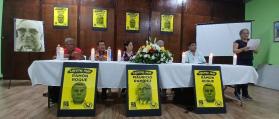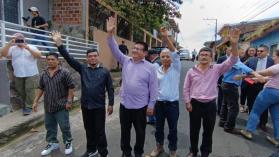Night Terror in El Salvador: How Young Organizers Have Become Unwitting Victims of the U.S.-Funded Fight against Gangs
Originally published at Counterpunch.com by ALEXANDRA EARLY, Coordinator for U.S.-El Salvador Sister Cities
San Salvador - On December 12, 2012, 12 young people were arrested in the poor community of El Progreso 3, in the northeastern part of San Salvador. Dressed all in black with their faces covered, police from the much-feared Anti-Gang Unit stormed the community in the middle of night, going home to home trampling down doors and pulling young people from a community center. The police claimed that the goal of the raid was to arrest suspected gang members, but several young community leaders were also apprehended, while their terrified families and neighbors looked on. The students were taken directly to jail, charged with illicit association, and thrown into crowded cells already filled with accused criminals awaiting trial.
Now, nearly a month after the raid, neighbors and members of the Movement of Popular Resistance-October 12 (the MPR-12), a national alliance of community organizations and unions, are demanding that the six youth leaders arrested be released from the overcrowded temporary jail where they are being held in inhumane conditions. Community members gathered in front of the downtown office of the Ombudsman of Human Right to show support for these falsely accused youth leaders and demand that the national police and specialized anti-gang units stop terrorizing the communities in and around the areas where the students were arrested.
About 50 people, including family members and neighbors of the arrested youth, addressed the Salvadoran press and held signs declaring, “Organizing to Improve our Communities is not a Crime” and, “Stop the Criminalization of Protest.” Ana Gladis Rivera, spoke about her twenty-five -year old son, Emerson Rivera, who, along with a friend and fellow youth organizer, Giovanni Aguirre, has been in hiding since the raid, fearing that to turn himself over to the authorities would land him in another overcrowded jail cell.
Like the others, Emerson’s mother was indignant at the charges of illicit association brought against her son, who has organized popular education schools, soccer tournaments and health campaigns in the community, and has worked with his neighbors on infrastructure projects in which the municipal government declined to invest. The MPR-12 alliance awarded Emerson and Giovanni scholarships in recognition of their local and national youth organizing work, and the two were expecting to start their university studies this month. Rivera believes that her son and fellow youth organizers are being targeted because of their involvement with the leftist FMLN party and their outspoken criticism of the administration of Mayor Norman Quijano of the right-wing ARENA party. Quijano, who is also ARENA’s candidate for the 2014 presidential elections, has been widely criticized for his disregard for the poorer sectors of San Salvador. In November, Quijano ordered the violent eviction of thousands of street vendors, the majority of whom are single mothers with no other source of income.
Since the young men are charged with being tied to gang or organized crime, their cases are part of a specialized court system made up of police judges trained by the U.S. run International Law Enforcement Academy (ILEA). Under this specialized system, it seems that the police need very little, or even no, evidence to charge suspects with illicit association. In their first hearing in December, neither the youths nor their lawyers were able to present evidence in their defense. In 2007, the Committee in Solidarity with the People of El Salvador (CISPES) reported on the increase in instances of police violence against young people and activists since the opening of the ILEA in 2005. These and other reports about the valuable lessons being imparted at the ILEA seem to contradict its stated goal of creating “a regional community of law enforcement professionals capable of effectively and efficiently fighting transnational crime, through the use of modern techniques and tools, with the utmost respect for human rights and the well-being of the people.” The terrorized residents of urban communities like El Progreso 3 would certainly question that description of their local police force. One of the El Progreso 3 residents told the staff of the Human Rights Office that a police officer stole $2000 from her neighbor during the December 12th raid and threatened to kill him if he reported the crime.
Community members from El Progreso 3 have been struggling under the dual pressures of police harassment and the violence of street gangs for some years. Carlos Vasquez, who works with the Catholic Church on violence prevention efforts in El Progreso 3 and surrounding communities complained that the police didn’t even investigate the murders of community members killed by gang members in past years. Their only activity was to , enter the community to collect the dead bodies. Instead of working on violence prevention, Vasquez says the police have ramped up their harassment of youth in the community, monitoring and photographing their organizing activities and movements. Residents fear that the anti-gang police will raid the community again using this information and they worry who will be taken next.
In the meantime, Emerson Rivera and his friend Giovanni Aguirre remain in hiding. Their fellow youth organizers are stuck inside an overcrowded jail and are only allowed to see their mothers once a week for three minutes when they come to deliver food. The youths were thus unable to participate in a soccer tournament they had organized and could not celebrate the holidays with their families. They are waiting for the slow process of justice to continue, since their next court hearing may not be for three or four months. Ana Gladis Rivera and her neighbors and friends, however, will continue organizing for the release of the young leaders, hoping that with the support of Salvadoran and international human rights organizations Emerson, Giovanni and the others might be able to get back to their important work of improving their community and fighting for a more just and fair El Salvador.

 "I am a CISPES supporter because continuing to fight for social justice and a more people-centered country means continuing the dream and sacrifice of thousands of my fellow Salvadorans who died for that vision.” - Padre Carlos, New York City
"I am a CISPES supporter because continuing to fight for social justice and a more people-centered country means continuing the dream and sacrifice of thousands of my fellow Salvadorans who died for that vision.” - Padre Carlos, New York City

